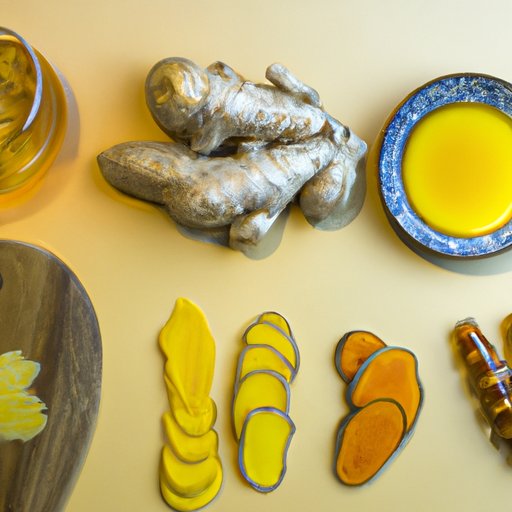
I. Introduction
Ulcers are open sores that develop in the lining of the stomach, small intestine, or esophagus. They can cause a burning or gnawing pain, sometimes accompanied by bloating, indigestion, and heartburn. If left untreated, they can lead to complications such as bleeding and perforation of the stomach or intestine. In this article, we will explore the different approaches to treating and managing ulcers, including natural remedies, diet, probiotics, stress management, and topical treatments.
II. The Top 5 Natural Remedies for Treating Ulcers
Natural remedies can be a safe and effective way to treat ulcers. Here are some of the most commonly used natural remedies:
- Manuka honey: This type of honey has antimicrobial properties and can help to soothe the inflammation and irritation caused by ulcers. Scientific studies have shown that it can be as effective as some medications in treating ulcers.
- Garlic: Garlic has antibacterial properties and can help to reduce the risk of ulcers caused by H. pylori bacteria. It can also help to boost the immune system and reduce inflammation.
- Cabbage juice: Cabbage juice contains substances that can help to promote healing and reduce inflammation in the lining of the stomach. It has been found to be effective in treating peptic ulcers.
- Probiotics: Probiotics are beneficial bacteria that can help to restore the natural balance of the gut microbiome. This can be especially helpful for ulcers caused by H. pylori, as probiotics can help to reduce the growth of this bacteria.
- Aloe vera: Aloe vera has anti-inflammatory and antibacterial properties and can help to reduce the inflammation and irritation caused by ulcers. It has been found to be effective in both oral and topical forms.
While these natural remedies can be helpful in treating ulcers, it’s important to be aware of any precautions or side effects. For example, excessive intake of honey can cause diarrhea, and garlic can interact with certain medications. It’s important to speak with a healthcare professional before starting any natural remedies.
III. The Benefits of a Low-Acidic Diet in Healing Ulcers
A low-acidic diet can be very beneficial for those with ulcers, as it can help to reduce irritation and inflammation in the lining of the stomach. Here are some tips for following a low-acidic diet:
- Avoid acidic foods: Foods and beverages that are high in acidity, such as citrus fruits, tomatoes, and vinegar, can irritate the lining of the stomach. It’s best to avoid these foods when trying to manage ulcers.
- Incorporate alkaline foods: Foods that are alkaline, such as leafy green vegetables, can help to neutralize stomach acid and reduce inflammation. It’s a good idea to incorporate these foods into your diet.
- Avoid caffeine and alcohol: Caffeine and alcohol can both irritate the lining of the stomach and should be avoided when trying to manage ulcers.
- Eat smaller, more frequent meals: Eating smaller, more frequent meals can help to reduce the amount of acid in the stomach and prevent irritation.
IV. The Role of Probiotics in Ulcer Management
Probiotics can be very effective in managing ulcers, especially those caused by H. pylori bacteria. Here’s how they work:
Probiotics are beneficial bacteria that can help to restore the natural balance of the gut microbiome. This can be especially helpful for ulcers caused by H. pylori, as probiotics can help to reduce the growth of this bacteria. The most effective types of probiotics for ulcer management are those that contain the strains Lactobacillus and Bifidobacterium.
V. How to Manage Stress to Improve Ulcer Healing
Stress and anxiety can exacerbate the symptoms of ulcers and make them more difficult to manage. Here are some stress-management techniques that can help to improve ulcer healing:
- Meditation and deep breathing: These techniques can help to calm the mind and reduce stress levels.
- Exercise: Regular exercise can help to reduce stress levels and promote overall health and well-being.
- Yoga: Yoga combines physical movement, breathing, and meditation to help reduce stress and promote relaxation.
- Counseling: Talking to a counselor or therapist can be helpful in managing stress and anxiety.
VI. The Effectiveness of Traditional Medicine in Treating Ulcers
Traditional medicine can be effective in treating ulcers, but it’s important to be aware of the scientific evidence supporting their effectiveness and any potential risks:
Some of the most popular traditional medicines for ulcers include licorice root, chamomile, and slippery elm. Licorice root has been found to be effective in reducing the symptoms of ulcers and promoting healing. Chamomile can help to soothe the stomach and reduce inflammation. Slippery elm can help to protect the lining of the stomach and reduce irritation. However, it’s important to speak with a healthcare professional before using any of these remedies, as they can interact with certain medications and may not be suitable for everyone.
VII. Topical Treatments for Relief from Ulcer Pain and Discomfort
Topical treatments can be very effective in relieving the pain and discomfort caused by ulcers:
Some of the most commonly used topical treatments include antacids, sucralfate, and lidocaine. Antacids can help to neutralize stomach acid and reduce irritation. Sucralfate can help to protect the lining of the stomach and promote healing. Lidocaine can help to reduce pain and discomfort. However, it’s important to be aware of any precautions or side effects associated with these treatments.
VIII. Conclusion
Ulcers can be a painful and uncomfortable condition, but there are many different approaches to treating and managing them. Natural remedies, a low-acidic diet, probiotics, stress management, traditional medicine, and topical treatments can all be effective in promoting healing and reducing symptoms. However, it’s important to seek professional medical advice if symptoms persist and to be aware of any precautions or side effects associated with these treatments. With the right approach and a bit of patience, it’s possible to manage ulcers and improve your overall quality of life.





